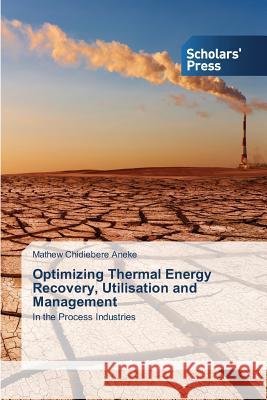Optimizing Thermal Energy Recovery, Utilisation and Management » książka
Optimizing Thermal Energy Recovery, Utilisation and Management
ISBN-13: 9783639510959 / Angielski / Miękka / 2013 / 240 str.
The persistent increase in the price of energy, the clamour to preserve our environment from the harmful effects of the anthropogenic release of greenhouse gases from the combustion of fossil fuels and the need to conserve these rapidly depleting fuels has resulted in the need for the deployment of industry best practices in energy conservation through energy efficiency improvement processes like the waste heat recovery technique. In 2006, it was estimated that approximately 20.66% of energy in the UK is consumed by industry as end-user, with the process industries (chemical industries, metal and steel industries, food and drink industries) consuming about 407 TWh, 2010 value stands at 320.28 TWh. Due to the high number of food and drink industries in the UK, these are estimated to consume about 36% of this energy with a waste heat recovery potential of 2.8 TWh. This work presents the importance of waste heat recovery in the process industries in general, and in the UK food industry in particular, with emphasis on the fryer section of the crisps manufacturing process, which has been identified as one of the energy-intensive food industries with high waste heat recovery potential
The persistent increase in the price of energy, the clamour to preserve our environment from the harmful effects of the anthropogenic release of greenhouse gases from the combustion of fossil fuels and the need to conserve these rapidly depleting fuels has resulted in the need for the deployment of industry best practices in energy conservation through energy efficiency improvement processes like the waste heat recovery technique. In 2006, it was estimated that approximately 20.66% of energy in the UK is consumed by industry as end-user, with the process industries (chemical industries, metal and steel industries, food and drink industries) consuming about 407 TWh, 2010 value stands at 320.28 TWh. Due to the high number of food and drink industries in the UK, these are estimated to consume about 36% of this energy with a waste heat recovery potential of 2.8 TWh. This work presents the importance of waste heat recovery in the process industries in general, and in the UK food industry in particular, with emphasis on the fryer section of the crisps manufacturing process, which has been identified as one of the energy-intensive food industries with high waste heat recovery potential











